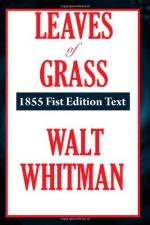
|
| Name: _________________________ | Period: ___________________ |
This test consists of 15 multiple choice questions and 5 short answer questions.
Multiple Choice Questions
1. Who does Whitman consider to be dear and dreadful to the earth, as he writes in one of his poems?
(a) Beginners.
(b) Women.
(c) Truth tellers.
(d) Sages.
2. In what state did Whitman see the live-oak growing, and named a poem after this occurrence?
(a) Maine.
(b) Delaware.
(c) Maryland.
(d) Louisiana.
3. What shape is Paumanok, according to the way that Whitman describes it in his poetry?
(a) Fish.
(b) Spiral.
(c) Square.
(d) Bean.
4. "Carry me when you go forth over land or sea; For thus merely ______________ you is enough, is best."
(a) Feeling.
(b) Touching.
(c) Knowing.
(d) Breathing.
5. Which sort of bird caused Whitman to stop and open listen to it opening its throat and joyfully singing?
(a) Robin.
(b) He-bird.
(c) She-bird.
(d) Song dove.
6. What is NOT a word which is used to describe the poets Whitman says are still to come in the world?
(a) Athletic.
(b) Continental.
(c) Honest.
(d) Native.
7. Whitman says that he is not sure, but the high soul of lovers welcomes _______ most.
(a) Death.
(b) Truth.
(c) Lust.
(d) Desire.
8. What has been named with can not be countermanded in struggles and in wars?
(a) Goal.
(b) Death.
(c) Birth.
(d) Truth.
9. What carry the filaments of the news of wars, deaths, losses, gains, passions, and of race?
(a) Telegraphs.
(b) Breezes.
(c) Phones.
(d) Pigeons.
10. Whitman ponders where he actually knows anything of his own ________ as he thinks about the biography of another.
(a) Life.
(b) Message.
(c) Needs.
(d) History.
11. Who does Whitman see eating the bread of his last supper in the midst of youths and old persons?
(a) Christ.
(b) A homeless man.
(c) Mary.
(d) A death row inmate.
12. What is the city of orgies, according to Whitman's poem of the same name?
(a) Newark.
(b) Chicago.
(c) Manhattan.
(d) Boston.
13. The ___________ cheerfully braves the winter, says Whitman when he addresses this group, the snow and ice welcoming him.
(a) Canadian.
(b) Delawarean.
(c) Alaskan.
(d) Kanadian.
14. What do the lovers who exit the room after the night leave over baskets, swelling the house with their plenty?
(a) Words.
(b) White towels.
(c) Money.
(d) Birds.
15. Who does Whitman point out are subordinated at their tasks during "Calamus"?
(a) Children.
(b) Women.
(c) Men.
(d) No one.
Short Answer Questions
1. Where does Whitman say there are beautiful hills which should be recognized as such?
2. Whose self does Whitman sing when he begins his collection of poems in this particular book?
3. Whitman addresses other countries who are striving to prove the puzzle of America, the athletic ______________.
4. What color is the water in the poem, "In Cabin'd Ships at Sea," as it moves around the boat?
5. Whitman realizes he was still not happen when he heard _________ and was received well at the capitol.
|
This section contains 429 words (approx. 2 pages at 300 words per page) |

|




